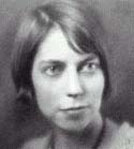
|
EudoraWeltyOnstage.com
The stories of America's great writer performed onstage
About
Eudora Welty
Eudora Welty was born in Jackson, Mississippi in
1909. What she saw and understood in that city and state inspired her
life's remarkable contribution to world literature. Eudora Welty wrote
five novels, many famous short stories, many wise essays. She took remarkable
photographs. She amassed a body of work simultaneously strong and supple,
delicate and refined, personal and universal. In the summer of 2001 she
passed away, honored as one of America's treasures.
In
her lifetime Miss Welty's writing was grouped with other Southerners,
with other women, with other Americans. Now, seen as a whole, the body
of her work emerges, like Chekhov's, like Jane Austen's, specific to its
time and place: timeless in its resonance.
Welty's writing, which can be laugh outloud funny, bears witness to the
rapture of the commonplace: a plate with bread, the love between a husband
and wife, a school bus, Her confrontations with the great issues of her
time and place - poverty, racism, ignorance - were subtle and indirect,
and controversial for their subtlety.
She took photographs while traveling throughout Mississippi on assignment for the WPA. Her portraits bear witness that faced with hardship the human spirit is irrepressibly hopeful, saucy and proud. So, too, were the characters and stories she created.
Tributes
to a life's work
The Philadelphia Inquirer
“Eudora Welty, chronicler of Southern life …When a beloved
writer dies, the world loses a great figure, but the writing remains.”
The Los Angeles Times
“Eudora Welty should be required reading …one of modern America's
most celebrated writers, a lyrical homebody who found great moments in
the commonplace.”
The
New York Times
A reader might almost
imagine that Jackson formed like a pearl around her and that she was its
luster.
The
Dallas Morning News
“Eudora Welty last survivor of the Southern Renaissance …
her presence resonated throughout American culture.”
The
Washington Post
“Eudora Welty grand lady of American literature … Was Welty
a regional writer? Yes, ma'am. But she was also worldly. The major themes
of her stories were not the traditional Southern self-flagellation motifs
of guilt and oppression and racism and violence. Her characters, like
her fiction and her life, are not complex. They are dead-on, powerful,
sophisticated in their simplicity.”
USA
Today
“Eudora Welty's lyrical prose filled up her 'daring life' …
She could be tender, tough and comic. She rejoiced in a sense of place,
the South, but wrote universal stories about pain and loss, family and
community.”
People
Magazine
“Eudora Welty leaves a legacy of award-winning writing and legions
of loving fans. Finely observed tales of small town Mississippi life …
were acidly funny and as southern as a hot buttered biscuit.”
CNN
“Eudora Welty’s stories bear repeating … While we wait
for another such genius to appear on the horizon, we can read to our heart’s
delight in the fiction of Eudora Welty.”
Salon.com
”Forget that ‘greatest Southern writer’ stuff. She was
a deadly funny writer and a sly, gracious queen of literature.”
Time
Magazine
“Considered by many literary critics to be America's greatest living
writer … Welty's many honors included the Pulitzer Prize in 1973
for ‘The Optimist's Daughter.’ The recipient of numerous honorary
degrees, including ones from Harvard and Yale, Welty was also recognized
internationally. In 1987, France knighted her. Welty's autobiography,
‘One Writer's Beginnings’ became the longest-running book
on The New York Times' best-seller list in 1984.”
|
Written
by Eudora Welty |
For
further information:
The
Eudora Welty Foundation
The Eudora Welty NewsLetter
The
Mississippi Writer's Page: Eudora Welty
The
Eudora Welty Society
Mississippi
Department of Archives and History